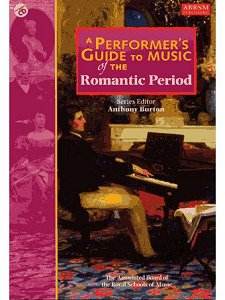Books Review for Seen&Heard
ABRSM Performers’ Guides A Performer's Guide to Music of the Baroque Period; A Performer's Guide to Music of the Classical Period; A Performer's Guide to Music of the Romantic Period ABRSM (Publishing) Ltd £14.95 each volume (PGW)
When I learnt the piano as a child, the notion of ‘period style’ scarcely existed. The Associated Board of the Royal Schools of Music, and its examinations which children were put through, reflected the conservative tastes of the time.These three stimulating new guides to music of the Baroque, Classical and Romantic periods, following their innovative Spectrum publications conceived by Thalia Myers, which are introducing many students of modest technical accomplishment to new music, reflect a sea-change transformation of attitudes to musical appreciation and teaching, in which Britain is at the forefront (Spectrum 3 for Grades 3-7 demonstrates how contemporary composers across the globe have absorbed the traditions of Western classical music to form their own unique and exciting language).
Edited by Anthony Burton, and with presentation by Geoffrey Wadsley as attractive as you could wish, these books make for absorbing yet easy reading and contain a wealth of information. Many of the topics covered can be found treated in the New Grove Dictionary of Music and Musicians 2nd Edition – ‘the focal point of serious musical study in the English language’ - but that costs £2,950! Each of the slender ABRSM volumes is packed with wisdom, discussing the latest thinking on period performance in a clear, helpful and undogmatic way, featuring chapters from leading experts on historical background, notation and interpretation, sources and editions. They are lavishly illustrated and the full-length CDs of carefully chosen excerpts from authoritative recordings are conveniently cross-referenced; readers will be tempted to acquire some of those CDs that are available.
I have relished (taking a few chapters at random from the first volume) the overview of the earliest music covered; Christopher Hogwood’s flexibility towards ‘Historically Informed Performance’ (HIP), George Pratt’s emphasis on the power of Baroque music to communicate ‘strong passions’, Peter Holman’s introduction to the pitfalls and limitations of notation. Clifford Bartlett, Editor of the refreshingly forthright Early Music Review, tells us that many musicians find music of the Baroque period especially rewarding because so much is left to the performers, but they are warned to be always alert about sources and editions – ‘if an elderly relative offers you a pile of music, be duly grateful but be extremely cautious in using it’. I was especially pleased that harpsichordist Davitt Moroney restores the humble, quiet clavichord (my own instrument) to its central importance in the history of keyboard performance. It is now enjoying a resurgence of appreciation, with regular CD releases, and is ideal for home listening late evening – or for playing yourself if you have neighbours not to be disturbed!
Modestly priced, and intended to add to the knowledge and understanding of amateur and professional musicians and all music lovers, they should be absolutely indispensable for critics, all of whom, no doubt, take their role seriously and have thought also about Hans Keller’s withering views about their ‘phoney profession’ to be found in his Criticism (Faber & Faber). Those who prefer classical and romantic music will find the other volumes equally valuable, whether they be performers or listeners who seek to be better informed.
Next I would hope that ABRSM and its splendid publications team will turn their attention to the performance of even earlier pre-Baroque and the latest music of the post-romantic and contemporary eras, drawing upon the wealth of performer/writer expertise available to try to drag us all into the new millennium and take those esoteric repertoires out of their respective ghettos.
Peter Grahame Woolf
Purchase: Baroque Classical Romantic £14.95 each
Contributors to the Baroque volume: Christopher Hogwood Introduction, George Pratt Historical Background, Peter Holman Notation and Interpretation, Davitt Moroney Keyboard, Andrew Manze Strings, Stephen Preston Wind Instruments, John Potter Singing, Clifford Bartlett Sources and Editions
Contributors to the Classical volume: Jane Glover Introduction, David Wyn Jones Historical Background, Cliff Eisen Notation and Interpretation, David Ward Keyboard, Duncan Druce Strings, Colin Lawson Wind Instruments, Richard Wigmore Singing, Barry Cooper Sources and Editions
Contributors to the Romantic volume: Sir Roger Norrington Introduction, Hugh Macdonald Historical Background, Clive Brown Notation and Interpretation, Roy Howat Keyboard, David Goode Organ, Robin Stowell Strings, Trevor Herbert Wind Instruments, David Mason Singing, Robert Pascall Sources and Editions

 Return to:
Return to: